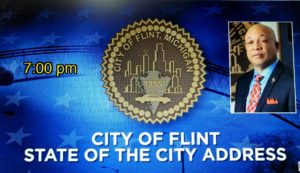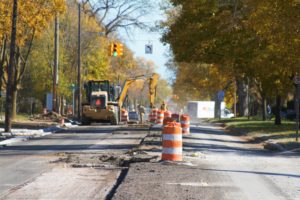By Paul Rozycki
Beginning by saying that he was “a simple guy born and raised in Flint” and concluding by urging city residents to “keep building a stronger Flint together” to fight blight, crime, improve infrastructure and public services, Flint Mayor Sheldon Neeley delivered his second State of the City address Tuesday, Dec. 14. The meeting was held virtually for both the public and the Flint City Council meeting.

During the half-hour presentation, Mayor Neeley covered what he said he considered the major challenges facing the city and the major goals his administration has accomplished.
“We are proud of what we have achieved so far. I’m proud of my administration,” he said.
At the conclusion of the address, the heads of Flint’s Department of Public Works, Economic Development, and the city’s Chief Financial Officer summarized the challenges and accomplishments in their departments.
First, slow the spread of COVID
Neeley began by saying that Flint “must do our part to slow the spread of COVID” and urged everyone to get tested and vaccinated, as he gave contacts for those services.
Public safety a key to city’s growth
He then addressed the issue of public safety, and said that it was key to the growth of Flint. Neeley noted that the fire department is fully staffed for the first time in five years, that there have been 22 new hires in the police department, and that “we need more cops on the street.”

Flint Police vehicle parked in front of City Hall on Saginaw Street downtown Flint. (Photo by Tom Travis)
He said the rise in homicides in the city, which are approaching record levels, has caused him to “do what is necessary” and declare a state of emergency to reduce the violence. While homicides have increased overall, crime is down. He said he hoped new gun laws and regulations from the state legislature might also help.
Blight efforts yielding results
Fighting blight was his next objective. Neeley said that more than 240,000 pounds of trash, have been removed from the city, above and beyond the normal trash pickup, and encouraged citizens to work with partners to reduce blight and clean up their neighborhoods. He called on residents to report illegal dumping.
Roads repaired, state park established
Turning to infrastructure. Neeley asserted Flint has had “success in infrastructure repair” and that many miles of roads have been repaired or resurfaced in the city. He also said that the first state park in Flint was established near the old “Chevy in the Hole” area, west of downtown, now called Chevy Commons.
Time to rebuild trust on water safety
As might be expected, Mayor Neeley addressed the Flint water situation by saying that “water is a human right” and that one of the major challenges with the Flint water crisis is that “trust needs to be restored.” In an attempt to build that trust, he said that Flint has now gone through three six-month testing cycles, that have shown the water to be safe, and reminded the public where they could still have their water tested if needed.

Flint water tower on N. Dort Hwy. (Photo by Tom Travis)
City budget balanced but tenuous
One of the key challenges facing the city are the city finances. Neeley spoke of new hires in the finance area, the fact that the current $71 million budget is balanced. But he also said there is much work to do, and that the city needs to control spending and legacy costs, if it’s going to keep a balanced budget. In particular he said that increasing pension fund contributions and other costs “are draining the budget,” and that the city needs to get control of it. That budget has been balanced by using $13 million in the “rainy day fund” which is now at a low $2.1 million.

The office of the city’s Finance department at City Hall. (Photo by Tom Travis)
Input sought on use of coming ARPA funds
One of the new hires, Rob Widigan, Flint’s Chief Financial Officer, spoke of the $94 million in American Rescue Plan Act (ARPA) funds that the city is to receive. The funds will be received over the next several years.
Widigan said one key to using the money wisely is to have a compliance firm on board, to make sure all the federal rules are followed. Failure to do so could result in the loss of the funds. In his presentation, Widigan said that the city will be seeking public input in deciding how to allocate the funds among several areas, such as economic development, health or infrastructure. He said while Flint faces a large structural deficit, that the federal rescue funds are “a once in a lifetime opportunity” and that the city must invest wisely.
United Way, small business partnerships noted
Economic Development Director Khalfani Stephens followed Widigan’s presentation by speaking about a number of programs and partnerships that are designed to aid small businesses in Flint. In particular a partnership with the United Way, and joint programs with several venture capital programs, are designed to give technical assistance to Flint’s businesses.
Mayor Neeley spoke of $84 million in new investment for economic development and small businesses and the critical need to develop partnerships, with those who can create jobs and careers, such as one created with Consumers Power. He said that 243 small businesses in Flint have been helped in this way.
Court Street finally paved after many delays
Mike Brown, head of the Department of Public Works spoke of some of the successes that his department has had. He said “Court Street is finally paved,” in spite of a history of water main breaks on East Court that have required repaving and repairs for much of the last year.

Street renovations on W. Court Street in the College Cultural Neighborhood in Flint. (Photo by Tom Travis)
He also said that water issues have improved with the development of the Dort pumping station, and several measures to control water pollution in the city. Brown concluded by giving phone numbers for those with water and sewer problems.
Shields and COVID victims Wideman, Burtley, Burks honored
During his presentation Mayor Neeley honored a number of Flint residents. He reminded listeners of Betty Wideman, who was a Transportation Operations Manager with the DPW, and passed away from COVID last year. The transportation building in the department has recently been named for her. He also honored Flint native and boxing champion, Clarissa Shields, educator Nate Burtley, and union leader and civil rights activist Ruben Burks. One of those to be honored will be former Mayor Floyd McCree, Flint’s first Black mayor, who will have a statue in his honor in front of Flint City Hall.
 EVM political commentator Paul Rozycki can be reached at paul.rozycki@mcc.edu.
EVM political commentator Paul Rozycki can be reached at paul.rozycki@mcc.edu.








You must be logged in to post a comment.